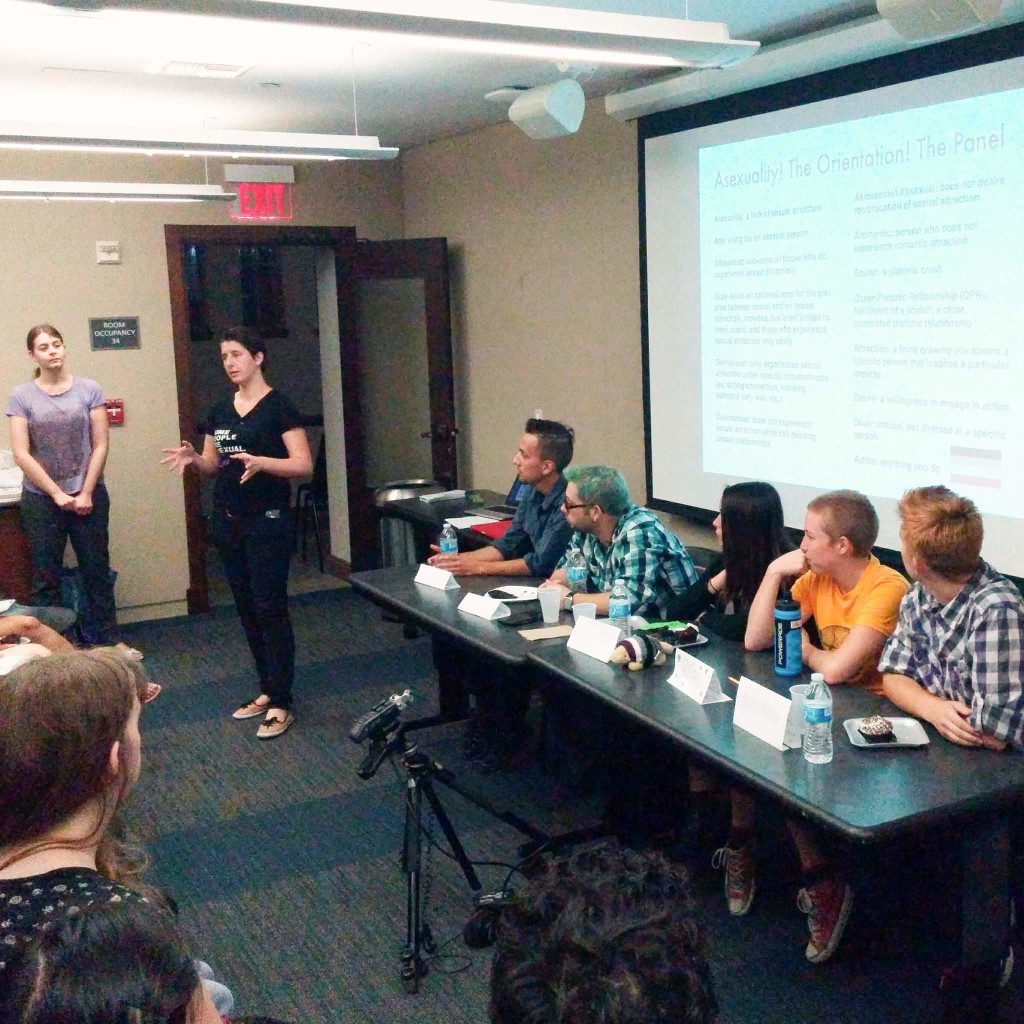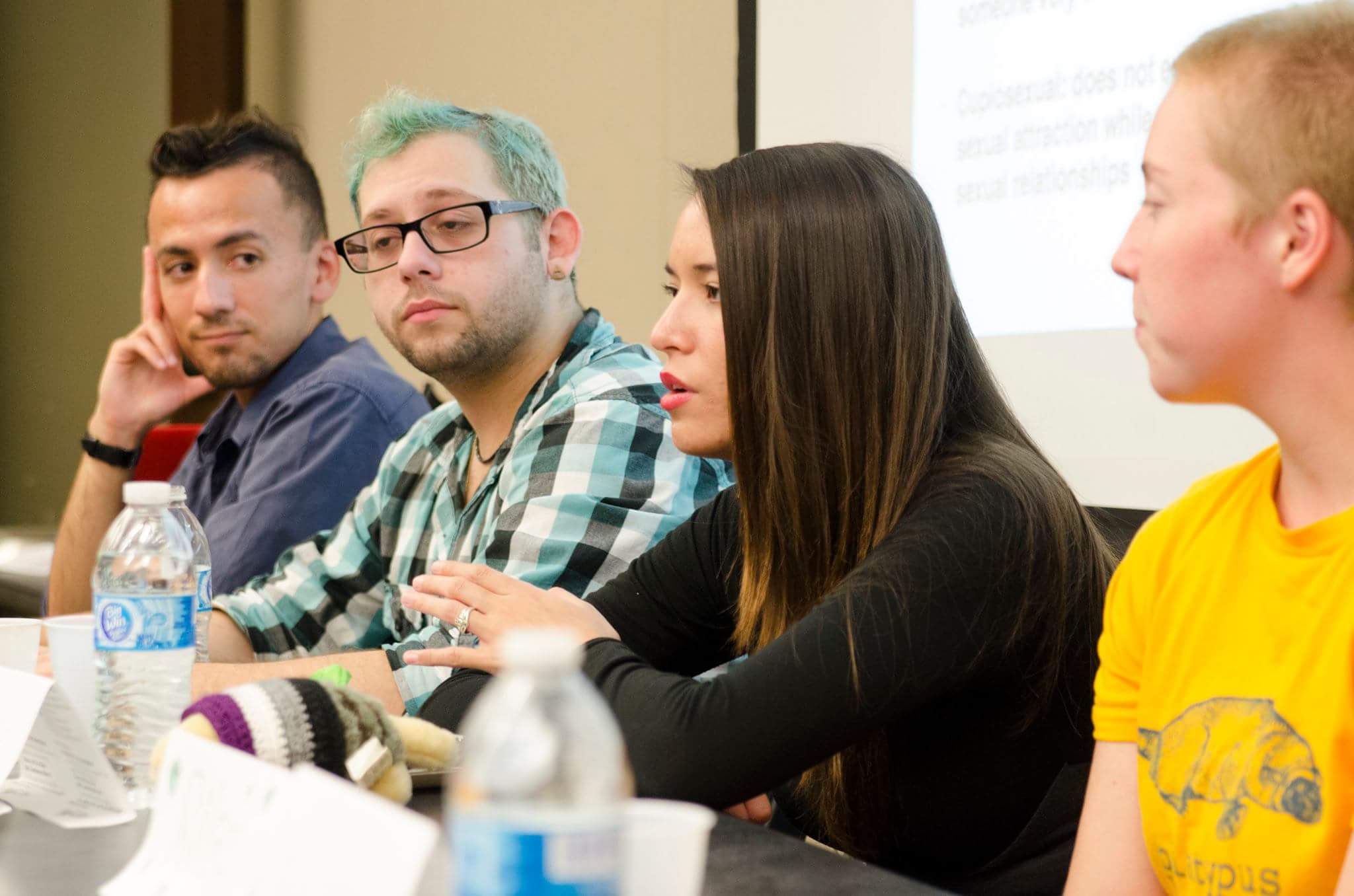WESTWOOD—On Thursday, October 22, an outreach and advocacy group known as Ace Los Angeles held a panel at UCLA about asexuality, the sexual orientation in which one does not feel any sexual attraction towards others. The panel consisted of five people, with diverse backgrounds, genders, and experiences. Asexuality is not as well-known as other orientations under the LGBTQ umbrella; the room was packed wall-to-wall, showing that interest in asexual people and awareness of the orientation is growing.
The panel began with an explanation of basic terms used by the asexual community, such as “ace,” the slang term for an asexual person, “aromantic,” the word for a person who feels no romantic attraction, and “allosexual,” the word used to describe a non-asexual person. Since romantic attraction (the desire to engage in a romantic, but not necessarily sexual, relationship with someone) is often separate from sexual attraction for asexual people, different romantic orientations were discussed, such a heteroromantic, homoromantic, and biromantic. Asexuality was described as a spectrum – not everyone who is part of the asexual community feels absolutely no sexual attraction. People who experience sexual attraction very infrequently are called gray-asexual, and those who only experience sexual attraction after a significant emotion bond has been established are called demisexual.

Canyon News spoke with Shari B. Ellis, one of the organizers of Ace Los Angeles, before the panel. She explained the importance of the work the group is doing.
“One of the main themes that you’ll come across when you talk to asexuals and aromantics is that until they find other people who identify similarly is that they often feel broken, because we are bombarded with messages that, in order to have a happy, healthy life, we have to be sexually active or have the desire to have sex. Immediately, we tend to be pathologized,” said Ellis.
She compared asexuality to other LGBTQ identities, saying, “I also think that visibility is something important because we face similar issues as a lot of queer people; we have coming out issues…It’s not easy to come out as an ace to our own parents, much less our friends or co-workers. But also we face other potentially more traumatic issues, like corrective rape – the idea that somebody will take it upon themselves to ‘fix us’ against our own will. I think that it’s important for people to be aware of what we face and hopefully with greater education and visibility, we’re hoping to eradicate those kinds of issues.”
The panel consisted of people across the asexual spectrum, including two people who were both aromantic and asexual, two people who were asexual but romantic, and one demisexual person. One of the aromantic, asexual people, Brelyn, is in what is called a “queer-platonic relationship” – a serious, committed relationship in which the bond is platonic, rather than sexual or romantic. People who are in queer-platonic relationships consider their partners to be significant others, like those in romantic relationships. They may participate in things that are seen as conventionally romantic, such as living together and showing physical affection, but the feelings and intent behind these behaviors are distinct from romantic ones.

One of the questions that was asked by the audience to the panelists was how friends and family members have reacted to them coming out as asexual. Most of the panel members had positive experiences, but one of them, Brennan, expressed the frustration that comes with having to constantly explain what your orientation is to new people. “You never really stop coming out,” he said. He also said that there is a big difference between acceptance and understanding; many friends and family members accept asexuality, but may not truly understand what it is or even attempt to.
An audience member asked the panel for advice on dating as an asexual person. She said that before the panel, she had not met any other asexual people, such as herself, who are interested in dating. It was an interesting conversation starter, because it revealed that aces have many differing attitudes towards sex. Some are repulsed by it and never want to have it, some feel neutral about it, and some actually enjoy it, despite that enjoyment not stemming from attraction. It’s rare for two asexuals to date each other, because of there are few openly asexual people in the dating pool; it is more common for couples to consist of one asexual person and one allosexual person. It’s an often difficult situation to navigate, but the panel members emphasized that communication is key, and that an asexual person should never be forced to do anything that they don’t feel comfortable with.
Another issue discussed was the stigma asexual people face when coming out to health professionals, specifically mental health professionals. Although the most recent version of the DSM (Diagnostic and Statistic Manual of Mental Disorders, widely used by people working in psychology and psychiatry) distinctly says that asexuality itself isn’t a disorder, many mental health workers did not study this version of the DSM in schools and are not aware of this update. This may lead to asexual people being misdiagnosed with Hyposexual Desire Disorder.
In her interview, Ellis explained why advocating for asexuality to be seen as a normal and valid orientation in important to her. “Personally, I’m an older ace, and it took me way too long to finally realize that I’m asexual, so one of the reasons why I’m very passionate about the education aspect of Ace LA is that I just don’t want teenagers or people in their twenties to go through the same thing I did: questioning themselves, and questioning their own instinct, and thinking that there’s something wrong with them when there’s nothing wrong with them.”
For more information on asexuality, visit the Asexuality Visibility and Education Network (AVEN). To get in contact with Ace Los Angeles, visit them on Tumblr, Meetup, or email asexualitylosangeles@gmail.com.






